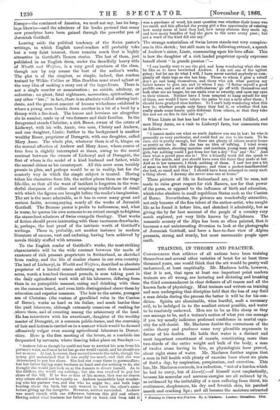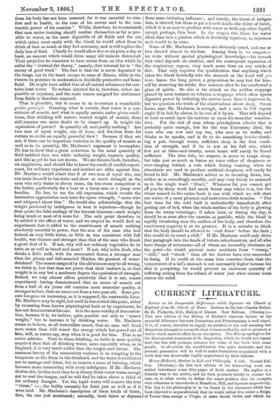TRATNTNG, IN THEORY AND PRACTICE.
CONSIDERING that athletes of all nations have been training themselves and several other varieties of beast for at least three thousand years, one would think that the art would be pretty well understood, at least empirically. Mr. Maclaren holds, however, that it is not, that upon at least one important point modern trainers are all wrong, are lecturing and dictating and breaking the third commandment in clear defiance of all reason and all the known facts of physiology. Most trainers and writers on training and men undergoing that discipline hold that the less of any fluid a man drinks during the process the better it will be for his con- dition. Spirits are abominable, wine hurtful, malt a necessary evil, to be indulged in to the smallest extent possible, and water to be resolutely eschewed. Men are to be as like sheep as they can manage to be, and a trainer's notion of what you can manage if you try usually indicates profound confidence in mortal capa- city for self-denial. Mr. Maclaren doubts the correctness of the entire theory and produces some very plausible arguments in favour of his doubts. He holds that water is a distinct and most important constituent of muscle, constituting more than two-thirds of the entire weight and bulk of the body, a man of twelve stone having in him, as physiologists have proved, about eight stone of water. Mr. Maclaren further argues that a man in full health with plenty of exercise loses about six pints of fluid a day, by respiration, perspiration, and excretion. This loss, Mr. Maclaren contends, is a reduction, "not of a burden which he had to carry, but of himself,—of himself most emphatically, because his muscular and nervous energies are all reduced by it, as evidenced by the irritability of a man suffering from thirst, his restlessness, sleeplessness, his dry and feverish skin, his parched mouth and cracking lips ; and all because the moisture extracted
* Training in 2hetwr and Practice. II, A, madmen. Loudon: museum'. M.
from his body has not been restored, for it was essential to com- fort and to health, to the tone of his nerves and to the con- tractile power of his muscles." While, therefore, he recommends that men under training should confine themselves as far as pos- sible to water, as the most digestible of all fluids and the one which mixes most easily with the blood, he would allow them to drink of that as much as they feel necessary, and as will replace the daily loss of fluid. Clearly he would allow five or six pints a day at least, an amount which would drive many old trainers distracted. Their prejudice he conceives to have arisen from an idea which he canes the "internal-fat theory," namely, that internal fat is "the enemy of good wind." The fact is that fat is never deposited in the lungs, nor in the heart except in cases of disease, while in the viscera its presence in moderation is decidedly protective and bene- ficial. He might have added that of all animal substances fat con- tains least water. To reduce internal fat is, therefore, either im- possible or injurious, and the main reason assigned for abstinence from fluids is therefore unsound.
That is plausible, but it seems to us to contain a remarkable petitio principii. Granting what is certain, that water is a con- stituent of muscle, and what is equally certain under given condi- tions, that drinking will restore wasted weight of muscle, there still remains one main doubt to be cleared up. Is weight the equivalent of power? Is quantity all, and quality nothing? Are two men of equal weight, size of bone, and freedom from fat certain to strike an equally powerful blow ? Because if they are not, if there can be important varieties in the quality of muscle as well as in its quantity, Mr. Maclaren's argument is incomplete. He has to show that a great reduction in the usual quantity of fluid imbibed does not, while reducing weight, improve quality, and this as yet he has not shown. We are thrown back, therefore, on empiricism, and should like to know the result of careful experi- ment, for ordinary experience and instinct are alike against him. Mr. Maclaren would admit that if of two men of equal size, one can train himself to ten stone and show as much strength as the man who only trains to eleven stone, the ten-stone competitor is the better, particularly for a boat or a horse race or a jump over hurdles. He has, to use the old expression, which reveals the instinctive appreciation men have for spare strength, "more wire and whipcord about him." He would also acknowledge that the weight produced by indulgence in beer is injurious—though he does quote the false analogy of the harvest labourer—such weight being much or most of it mere fat. The only point therefore to be settled is the effect of water, and we suspect he would find on experiment that it added to the constituents of muscle nothing absolutely essential to power, that the arm of the man who had trained on very little water, as little as was consistent with full health, was thinner and stronger than that of the man who drank a great deal of it. If not, why will not ordinary vegetables do to train on as well as bread and meat ? If not, why is the Arab, who drinks a little milk, with his attenuated frame, a stronger man than the plump and full-muscled Hindoo, the greatest of water- drinkers? The reason assigned by the old trainers may be all wrong, we think is, but that does not prove that their instinct is, or that weight is in any but a moderate degree the equivalent of strength. Indeed, we may almost affirm positively that it is not, recent experiment having demonstrated that an ounce of muscle cut from a bull of six years old contains more muscular quality, is stronger in fact, than an ounce cut from a two-year old. Some pro- cess has gone on increasing, as it is supposed, the contractile force. Mr. Maclaren may be right, but until he has settled this point, either by reasoning from known physiological facts or by experiment, he has not demonstrated his case. It is the more worthy of demonstra- tion, because it is, we believe, quite possible not only to "renew weight," but to increase it by drinking water. Mr. Maclaren seems to believe, as all teetotallers assert, that no man will drink more water than will renew the energy which has passed out of him, will, as nurses say, stop when it is good for him. That is an entire mistake. Next to dram-drinking, no habit is more quickly acquired than that of drinking water, more especially when, as in England, it is very much colder than the tongue and throat. The sensuous luxury of the momentary coolness is as tempting to the temperate as the dram to the drunkard, and the water is swallowed not to assuage real thirst, but to remove a sense of burning, which becomes more tormenting with every indulgence. If Mr. Maclaren doubts this, let him next time he is thirsty drink water warm enough not to cool the tongue, and he will find he takes about a third of his ordinary draught. Yet the tepid water will remove the true "thirst," i.e., the bodily necessity for fluid, just as well as if it were iced. Mr. Maclaren's description of three kinds of thirst, first, the one just mentioned ; secondly, local thirst or dryness
from some irritating influence ; and thirdly, the thirst of indiges- tion, is shrewd, but there is yet a fourth kind..-tlie thirst of habit, which it is as easy to produce with water as with any other liquid, except, perhaps, thin beer. In the tropics this thirst for water often rises into a passion which is decidedly injurious, as injurious as it would be in cows.
Some of Mr. Maclaren's lessons are obviously sound, and one or two shrewd almost to wisdom. Among them is, we suspect— we write without special physiological knowledge—his remark that wind depends on exercise, and the consequent expansion of the respiratory organs, very much more than on any article of diet. That only requires the qualification that anything which takes the blood decidedly into the stomach or the head will pro facto lessen the lung power, a proposition he may test for him- self by observing his stroke five minutes after he has swallowed a glass of spirits. So also is his attack on the sudden stoppage placed by most trainers on tobacco, a stoppage which often upsets digestive power by irritating the nerves more than it improves it, but we question the truth of the observations about sleep. Seven hours, says Mr. Maclaren, is enough, and a man in full vigour ought if in bed by eleven to be out. of it by six. That will depend at least as much upon his nervous as upon his muscular constitu- tion. For the sort of man whom prizefighters admire that is probably quite enough, but for the true University ideal, the man who can row and sap too, who sees as he walks, and thinks as he speaks, and is fit to do something besides chuck- ing a pole through water, sufficient sleep is the first condi- tion of strength, and if he is not at his full size, which few are at three-and-twenty, seven hours will rarely be found sufficient. The true rule, we suspect, is never to tempt sleep, but take just so much as leaves no trace either of sleepiness or over-sleeping behind, a rule which during training, when no stimulants are used to produce artificial sleepiness, will rarely be found to fail. Mr. Maclaren's advice as to sweating down, too, strikes us as exceedingly sensible, and may very wisely be summed up in the single word "Don't." Whatever fat you cannot get off you by sharp work had much better stay where it is, but the wisest remark in the entire book is one with which we will close our notice of a most pleasant and instructive little treatise. "The best time for the cold bath is undoubtedly immediately after getting out of bed, when the whole surface of the body is glowing from its warm "coverings ; if taken later, or during the day, it should be as soon after the exercise as possible, while the blood is rapidly circulating near the surface of the body, and therefore the reactionary capacity is at its greatest. It is a mistake to think that the body should be allowed to cool down' before the bath ; this would be to court a chill." If Mr. Maclaren could only drive that paragraph into the heads of tutors, schoolmasters, and all who have charge of swimmers—all of whom are incurably obstinate on the point—he would prevent more accidents from "cramp," "chill," and " shock " than all the doctors have ever succeeded in doing. If he could at the same time convince them that the temperature of a lad's stomach is not necessarily higher because his skin is perspiring, he would prevent an enormous quantity of suffering arising from the refusal of water just when nature 'most craves the relief.































 Previous page
Previous page